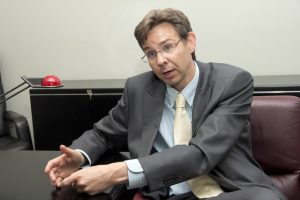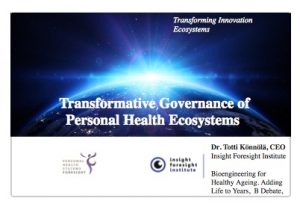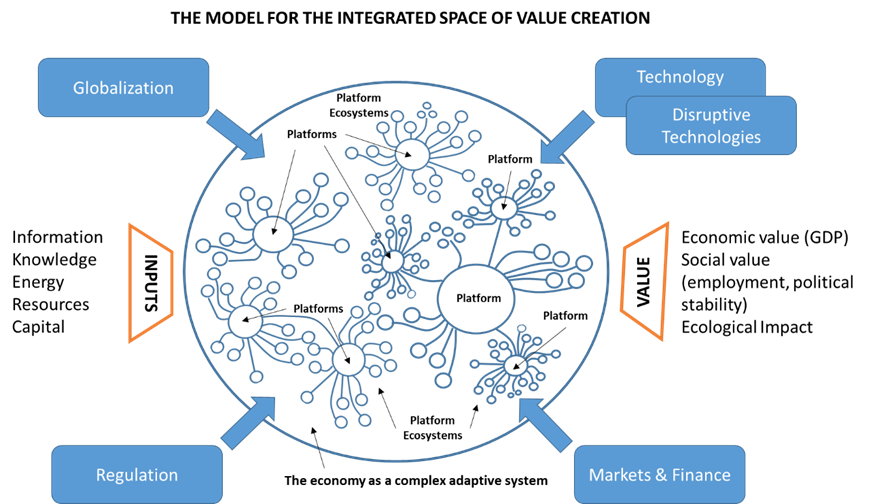
El Mundo, the leading newspaper in Spain, interviews Totti Könnölä on digitalisation and circular economy.
Totti Könnölä defends the role of ‘big data’, industry 4.0 or the economy and collaborative platforms as spurs to achieve economic and environmental sustainability.
A total of 16 tons. That is the amount of materials that each European consumes during a year. Of them, six tons end up turned into waste. And, of these, around 50% end up forgotten in a landfill with the consequent environmental impact and for the health of all.
This is an untenable situation for anyone with some common sense and who has driven political efforts of various kinds (recycling, restrictions on industrial waste, …), BUT often without addressing the root of the matter: the real nature of products and how they are generated, consumed and reused. We better talk about designing products thinking of their future beyond the life-cycle. To change our mindset from a model with beginning and end, to another where there are no extremes and everything flows forever.
“What we have now is a totally linear value chain, in contrast to what is being proposed by the circular economy: a systemic change that will allow us to reuse the products to create new ones and thus close the entire life cycle of the goods.“, Says Totti Könnölä, executive director of the Insight Foresight Institute. This man, whose life is halfway between Finland and Spain, is a recognized expert in innovation and sustainability.
The reason that the circular economy has not been firmly committed is that “typical chains have many actors and each of them seeks to optimize its business, but only does so with its share”. That inevitably results in a problem that is not technical (the recycling of materials takes years), but a business model. «The question is mainly organizational. Even in many cases, the waste is separated and then it ends up coming together again because it can not be used,” says Könnölä in an interview with INNOVADORES held at the Ramón Areces Foundation.
Faced with this panorama, marked by the dissonance between theory and practice, we asked Könnölä about the disruptor that makes this philosophy take off once and for all, not from production, but from survival as a species. «Digitization is key. Thanks to trends such as big data, we can take full traceability of the materials, know what their history is and how we can make better use of them, “he explains.
“concepts such as the collaborative platforms [e.g. Airbnb] allow better use of existing resources, avoiding the production of more goods than necessary. In addition, digitalization also facilitates that many products that were previously bought and sold, are now marketed as a service. By controlling the whole life cycle of the product, companies can design for future recycling or perform a more efficient preventive maintenance that reduces the need for spare parts.
Betting on the circular economy is the simplest solution to avoid reputational potholes derived from the purchase of materials (such as metals or minerals used in electronics) to countries in conflict, while reducing installed volatility in the commodity markets.
The platforms, adds this guru of the second opportunities, are especially interesting because, “as has happened with the music industry, intermediaries are removed from the chain, causing the different agents to abandon their traditional roles to connect or even be themselves both the producers and consumers of the same good ».
Some meeting points between two vertices can also be extended to the less glamorous area of waste. “In Atlanta (USA) they have created a platform to coordinate the collection of garbage and make matching with companies that can take advantage of it. That is to make an innovative use of waste. turning the problem of garbage into tremendous opportunities ». If we add to this equation the 4.0 industry and its capacity to personalize products and adjust the use of materials to the maximum, we have the perfect bases to make the circular economy a reality.
The interview available in English in El Mundo.
Find out also about our training on platforms.
 Invited speech of Dr. Totti Könnölä, CEO inf Insight Foresight Institute in the scientific conference ‘Bioengineering for Healthy Ageing. Adding Life to Years’ November 9th 2017, CosmoCaixa Barcelona.
Invited speech of Dr. Totti Könnölä, CEO inf Insight Foresight Institute in the scientific conference ‘Bioengineering for Healthy Ageing. Adding Life to Years’ November 9th 2017, CosmoCaixa Barcelona. Juan Mulet Melia, a member of the Innovation Council of IFI, and Totti Könnölä, CEO of the Insight Foresight Institute (IFI), write in Cinco Días, one of the leading economic journals in Spain, to promote smart specialization in the regions.
Juan Mulet Melia, a member of the Innovation Council of IFI, and Totti Könnölä, CEO of the Insight Foresight Institute (IFI), write in Cinco Días, one of the leading economic journals in Spain, to promote smart specialization in the regions. The ‘deep dive’ workshop for the EURO-CASE Innovation Platform was organised by the Royal Academy of Engineering of Spain (RAI), with José Manuel Sanjurjo as chair and Francisco Jariego, member of the Innovation Council of IFI, in colaboration with Totti Könnölä, CEO of IFI, in Madrid on January 30-31, 2017. The workshop focused on ‘SMEs, innovation and industrialisation’. The work built on the background discussion paper and the results of the Euro-CASE survey. This provided a basis for the integrated analysis on industrial innovation towards the year 2030 through industrial platform ecosystems that engage value networks of industrial providers, customers but also research and technology organisations (RTOs), Universities, startups and other SMEs as well as investors, public sector agencies and regulators. Particular attention was given to the future role of SMEs and the barriers to scale-up. Also recommendations were drawn to provide inputs to European policy-making.
The ‘deep dive’ workshop for the EURO-CASE Innovation Platform was organised by the Royal Academy of Engineering of Spain (RAI), with José Manuel Sanjurjo as chair and Francisco Jariego, member of the Innovation Council of IFI, in colaboration with Totti Könnölä, CEO of IFI, in Madrid on January 30-31, 2017. The workshop focused on ‘SMEs, innovation and industrialisation’. The work built on the background discussion paper and the results of the Euro-CASE survey. This provided a basis for the integrated analysis on industrial innovation towards the year 2030 through industrial platform ecosystems that engage value networks of industrial providers, customers but also research and technology organisations (RTOs), Universities, startups and other SMEs as well as investors, public sector agencies and regulators. Particular attention was given to the future role of SMEs and the barriers to scale-up. Also recommendations were drawn to provide inputs to European policy-making.